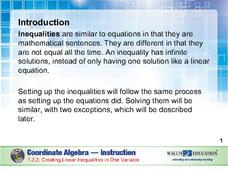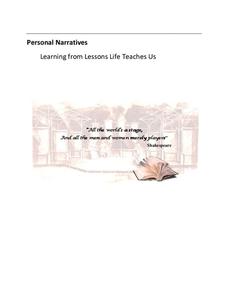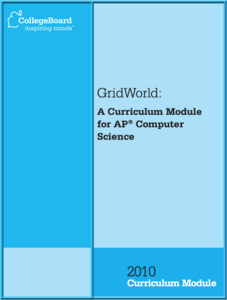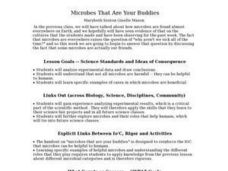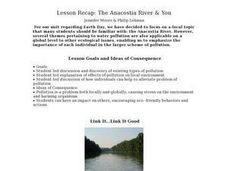Lerner Publishing
Teaching Folklore
Wonderful worksheets and activities complementing six sequential lessons are what you'll find in this unit on folklore. Pupils create folktales using literary devices and included story starters, compare and contrast different...
Reardon Problem Solving Gifts
Teaching Problem Solving Strategies in the 5-12 Curriculum
Address any kind of math concept or problem with a series of problem-solving strategies. Over 12 days of different activities and increasing skills, learners practice different ways to solve problems, check their answers, and reflect...
Core Knowledge Foundation
Weather or Not, Seasons Change
Embark on a year long investigation of the seasons with this 10-lesson earth science unit. After being introduced to different types of weather and the tools used to measure it, young scientists perform fun hands-on activities that...
BW Walch
Creating Linear Inequalities in One Variable
Just when a young mathematician starts to feel comfortable turning word problems into linear equations, shake things up and throw inequalities in the mix. This excellent, instructive presentation takes the steps for solving an...
Lerner Publishing
Teaching Habitats
What makes up a habitat? Use this resource to engage first graders in the exploration of desert, wetland, forest, and ocean habitats. Youngsters classify plants and animals into the four distinct habitats through drawings and cutting and...
ReadWriteThink
Teaching Point of View With Two Bad Ants
What better way to explain the concept of point of view than from an ant's perspective! After reading Two Bad Ants, pupils identify the point of view of the ants by studying the text and pictures. Then, they fill out a...
Boys Town
Teaching Social Skills, Creating Successful Students “Following Instructions” and “Listening”
With the help from learning games and holiday-themed coloring pages, scholars learn the importance of listening carefully and following directions. Coloring pages celebrate Halloween and Thanksgiving. Learning games include...
National Institute of Open Schooling
Adsorption and Catalysis
Adsorption, not absorption, is when atoms stick to the surface of an object, like water sticking to a grain of sand. An informative lesson delves into adsorption, teaching physical and chemisorption and the factors that affect them....
George W. Bush Presidential Library and Museum
Teaching Primary and Secondary Sources
What makes a source primary or secondary? Middle schoolers read a definition of each term before exploring different examples and applying their knowledge to a research project.
Thoughtful Education Press
Personal Narratives: Learning from Lessons Life Teaches Us
"First Appearance," Mark Twain's tale about overcoming stage fright, serves as a model of a personal narrative and gets young writers thinking about milestones in their own lives. After examining student models and considering the...
College Board
GridWorld: A Curriculum Module for Computer Science
Stretch out the grid. Teaching modules provide suggestions on how to use the case study, GridWorld, throughout the year as opposed to only right before the exam. The instructional units provide suggestions for presentations, assignments,...
EngageNY
Advocating Persuasively in a Fishbowl: Practice
What makes a good advocate? An informative lesson plan teaches class members how to advocate persuasively. They participate in a fishbowl activity and listen to the teacher model advocating persuasively. They then practice independently,...
Amani Project
The 5 Elements of Music
A series of activities teach young musicians that they don't need a room full of instruments to make music. The second activity in the Amani Project has participants use their hands, feet, and voices to demonstrate the five elements of...
Curated OER
The History of African-American Children: A Guide for Teaching Black History at the Elementary School Level
How do you introduce the topic of slavery to your youngest learners? The Sneetches, by Dr. Suess, is a great introduction to the idea of being different. Read the story to your class, and discuss desegregation in...
Curated OER
Hands on Your Heart - Biology Teaching Thesis
Students are able to recite the circulation of blood through the heart's various cavities and valves. They are able to appreciate what the actual valves and chambers of the heart look like. Students also have a clear vision of why the...
Curated OER
Gravity Versus The Mighty Egg - Biology Teaching Thesis
Students are able to describe the principles of gravity. They name other places in the real world where we compensate for gravity. Students design a shock absorber with limited materials and explain how it works to protect an egg. They...
Curated OER
Antibodies and the Immune Response Lesson Plans - Biology Teaching Thesis
Young scholars are introduced to bacteria and their role in biology and finishes with a lab experiment that focuses on antibiotics. They are given an overview of the important concepts involving bacteria and their potential resistance to...
Curated OER
Bacteria and Antibodies Lesson Plans - Biology Teaching Thesis
Students are introduced to 6 different lesson that deal with biology they include: The Good and Bad of Bacteria, An Introduction to Microbes, Microbes That Are Your Buddies, Bacteria and Water Purification, Microbes are Everywhere, and...
Curated OER
Cancer and the Cell Cycle - Biology Teaching Thesis
Identify the different stages of mitosis and what occurs in each stage with a straightforward biology lesson. Young scientists identify the importance of the cell cycle control in maintaining homeostasis, and then match the correct...
Curated OER
An Introduction to Microbes - Biology Teaching Thesis
Students are able to define microbes and identify the five main groups of microbes. They are able to give examples of ways in which microbes have impacted or currently impact human life. Students are able to explain that not all microbes...
Curated OER
Microbes Are Everywhere - Biology Teaching Thesis
Students are able to list at 3 rules for operating in a laboratory and to explain why each is important. They are able to identify problems with laboratory scenarios presented by the teachers. Students execute a lab protocol using...
Curated OER
Microbes That Are Your Buddies - Biology Teaching Thesis
Students analyze experimental data and draw conclusions. They are able to comprehend that not all microbes are harmful--they can be helpful to humans. Students are able to comprehend specific examples of cases in which microbes are...
Curated OER
Circulatory and Respiratory Systems Unit - Biology Teaching Thesis
Students Explain how an increased level of activity translates to cells needing more oxygen and how the lungs supply this oxygen by entering the blood stream. They also can explain that the heart is responsible for moving both oxygenated...
Curated OER
Lesson Recap: The Anacostia River & You - Biology Teaching Thesis
Seventh graders give examples of local sources of pollution and postulate reasons as to why local sources of pollution can harm the ecosystem. They address the following question in short answer form: "Why is litter/chemical pollution...
Other popular searches
- Teacher Resources
- Substitute Teaching
- Teaching Phonics
- Teacher Websites
- Teachers
- Teaching Main Idea
- Substitute Teacher Resources
- Teachers in Space
- Teaching Inference
- Teachers Sites
- Science Teacher Resources
- Teaching Volleyball





